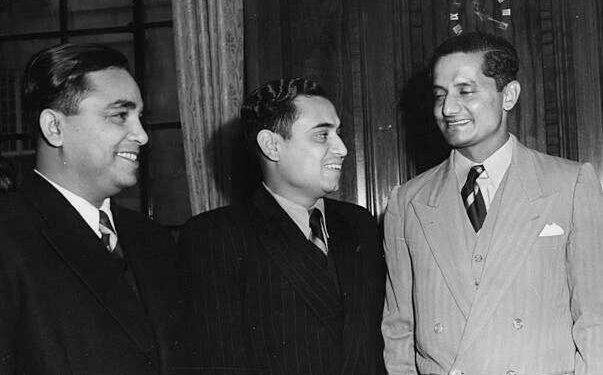Ravindra Jain (English: Ravindra Jain, born- 28 February, 1944, Aligarh, Uttar Pradesh; died- 9 October, 2015, Mumbai, Maharashtra) was a famous composer and singer of Indian Hindi cinema. He was mainly famous as a bhajan singer. Ravindra Jain was a composer of Hindi cinema who understood the world through his mind’s eyes.
Through the seven notes of the sargam, he returned many times more to his listeners than he received from the society. Apart from being the creator of melodious tunes, he was also an excellent singer and he surprised everyone by composing most of the songs as improvisations. Ravindra Jain was the second person after Manna Dey’s blind uncle Krishnachandra Dey, who created such a history in the audio-visual medium only with the help of audio, which became exemplary for the young generation. Famous musician and singer Ravindra Jain was born on 28 February 1944 in Aligarh city of Uttar Pradesh state. His father’s name was Pandit Indramani Jain and mother’s name was Kirandevi Jain. Ravindra Jain was fourth among his seven brothers and one sister. His eyes were closed since birth, which were opened through surgery by his father’s friend Dr. Mohanlal. It was also said that the child has light in his eyes, which can gradually increase, but do not let him do any work which will strain his eyes.
Ravindra Jain’s father, keeping in mind the doctor’s advice, chose the path of music, in which there is less use of eyes. Ravindra followed the orders of his father and brother and successfully tried to know and understand everything with his mind’s eyes. Listened to many novels on request from elder brother. Understand the meaning of the poems. Understood the essence of life from religious texts and biographies of historical figures. He was so intelligent since childhood that he would memorize anything he heard once, which he would always remember. His childhood was spent in a religious, philosophy and spiritual environment of the family. He used to go to the temple every day and singing a bhajan there was part of his daily routine. In return, father used to give a reward of one rupee for singing a bhajan.
Ravindra Jain may have been blind, but he did a lot of mischief in his childhood. The family rule was to enter the house and have dinner before sunset. Ravindra never followed this rule. Come home every day late at night. Mother would save me from father’s stick. She would hide food under the bed in his room so that the child would not remain hungry. Ravindra along with his group of friends used to form a singing group and hang around the railway station of Aligarh. His friend had a small tin box, on which he would sing and entertain everyone who passed by. One day, God knows what, I straightened the box. Seeing his open mouth, the audience started putting money in it. The box was filled with laughter. After coming home, he poured water at his mother’s feet. When father saw this, he became red with anger and ordered to return all the money to those who had given him. Now the problem came that how to return the money after searching the strangers? The friends planned to go to a chaat shop and eat chaat and pakodas and enjoy.
Ravindra Jain had heard a lot about Calcutta (present day Kolkata) and the ‘Ravindra Sangeet’ there. When uncle’s son Padma Bhai proposed to go there, he immediately agreed. Father gave seventy-five rupees for pocket money. Mother tied rice and pulses in a cloth bundle. When I got down with my brother at Kanpur station, the train started. Padma Bhai climbed up. Ravindra tried to run away. A hand coming out of the box pulled him inside. The stranger said, “Stay with us until you find your brother.” Ravindra got tuition in music through film producer Radheshyam Jhunjhunwala. Salty samosa with tea as remuneration. The first job was in Balika Vidya Bhawan for Rs 40 per month. It was in this city that he met Pandit Jasraj and Pandit Mani Ratnam. He was introduced to the new singer Hemlata. Together they started composing tunes in Bengali and other languages. Due to his closeness to Hemlata, he started getting offers from gramophone recording companies. Got a chance to play harmonium in a Punjabi film. Started getting up to Rs 151 for performing on a public platform. In this connection he came in contact with Haribhai Jariwala (Sanjeev Kumar). This bird from Calcutta flew to Mumbai.
In 1968, when Ravindra Jain came to Mumbai with Radheshyam Jhunjhunwala, he first met playback singer Mukesh. Ramrikh Manhar got opportunities to sing in some gatherings. The shooting of the film ‘Paras’ was going on in Devlali near Nashik. Sanjeev Kumar called producer N. N. Introduced to Sippy. Ravindra recited many priceless songs and tunes one after the other from his treasury. Shatrughan Sinha, Farida Jalal and Nari Sippy were also in the audience. His first film song was recorded on January 14, 1972 in the voice of Mohammed Rafi.
Meeting Tarachand Barjatya of ‘Rajshree Production’ through Ramrikh Manhar improved Ravindra Jain’s film career. There was no scope for songs in ‘Saudagar’ starring Amitabh Bachchan and Nutan. Despite this, Ravindra composed sweet tunes for the jaggery merchant, which became memorable. From here the caravan of Ravindra and Rajshree continued moving ahead. The songs of ‘Tapasya’, ‘Chitchor’, ‘Salakhen’, ‘Fakira’ became popular and Ravindra Jain’s name became established among Mumbai musicians. When Sachin Dev Burman fell ill during ‘Deewangi’, he handed over the film to Ravindra Jain. Ravindra Jain-Hemlata were singing in a gathering. Raj Kapoor was also in the audience. Raj Kapoor got excited after listening to the song ‘Ek Radha Ek Meera Both Ne Shyam Ko Chaha’ and asked – “Did you give this song to anyone?” Ravindra Jain retorted and said, “Given it to Raj Kapoor.” It was from here that he entered Raj Kapoor’s camp. Later, Ravindra Jain composed the music of ‘Ram Teri Ganga Maili’ and the film and music became very popular. Ravindra Jain died on October 9, 2015 in Mumbai, Maharashtra.






